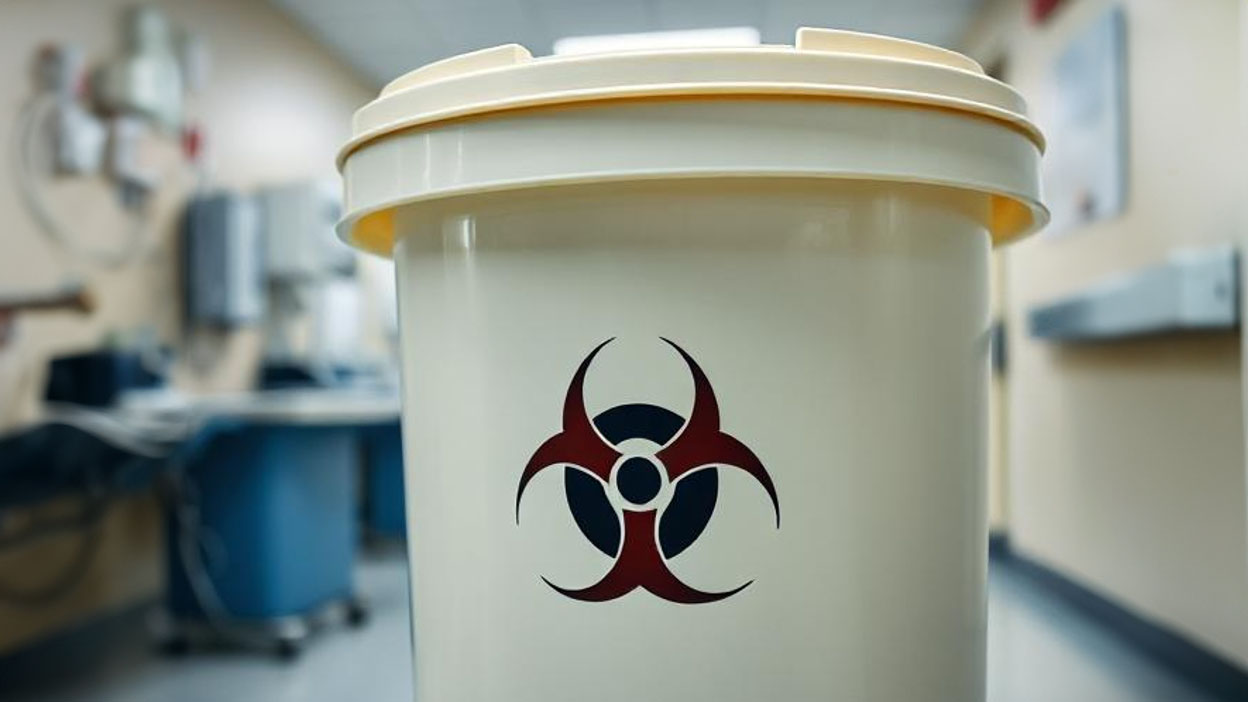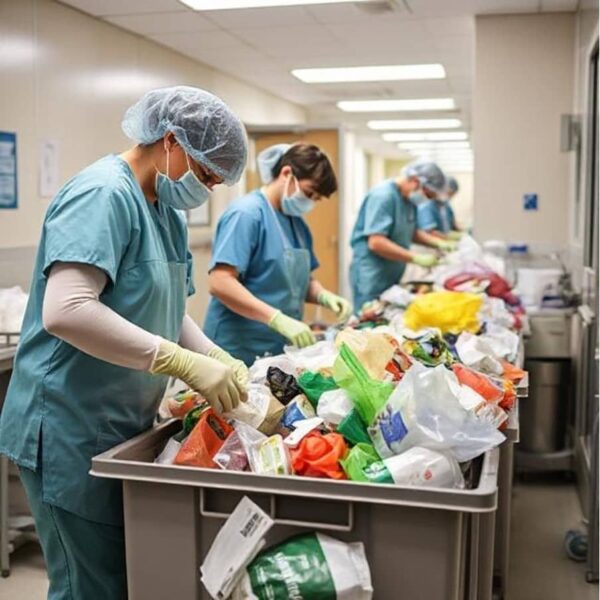Can Medical Waste Really Be Recycled Safely?

Not all medical waste has to go straight to a landfill or incinerator. A lot of healthcare providers still think everything used in a medical setting is either too contaminated or too risky to recycle. That’s not true. There are types of medical waste that can be safely recycled, and doing it the right way can lower costs and help the environment.
Recycling medical waste the right way starts with knowing what’s actually allowed to go through that process. We help clinics, hospitals, urgent care centers, and specialty offices across Texas handle this the right way. Our job at remedi is to make sure waste streams are sorted properly, safely, and within legal limits, so you’re never putting your license or reputation at risk.
Recyclable Plastics In Medical Waste
After they’ve been used in non-hazardous procedures and sterilized, these plastics are safe for recycling. They don’t need to end up in red bags if they’re not contaminated. We help you sort these properly and prevent you from tossing recyclable plastics into high-cost disposal bins. At remedi, our clinical waste disposal in Texas service supports these efforts with industry-compliant segregation.
Sharps Containers And Compliant Recycling
Once sharps containers have been fully treated and meet state requirements, certain types can be recycled. This depends on volume, sterilization method, and local rules. We provide sharps waste management services across Texas with clear labeling and pick-up schedules that meet OSHA standards.
Paper-Based Products And Secure Destruction
Items like packaging, non-contaminated medical office paper, or single-use record covers can often be recycled. We also provide secure document destruction services in Texas to make sure private information is protected before paper products are processed. Dental clinics often benefit from this using our dental waste disposal services.
Safe Chemo Waste Segregation
When chemotherapy waste is classified as “trace” (less than 3% of the drug remains), it may qualify for specific recycling routes. We help facilities safely collect and document trace chemo for safe transport and disposal. This is often built into our controlled substance disposal programs at remedi.
What makes this easier is having a waste partner that handles sorting with you—not after the fact. That’s how mistakes happen. We help build in better processes up front. Our pharmaceutical waste management systems include custom sorting containers and on-site support to separate what’s recyclable from what isn’t.
In most facilities, these recyclable materials don’t just take up space—they cost more when tossed into hazardous bins. Recycling properly keeps you compliant and cuts down on what you pay per pound for medical waste.
We’ve helped urgent care clinics, dental offices, and outpatient surgery centers across the state identify recyclable streams that were being thrown away unnecessarily. That’s why recycling medical waste safely isn’t just possible—it’s something we help clients do every day.
What Medical Waste Can’t Be Recycled?
It’s just as important to know what you shouldn’t try to recycle. Not everything in your waste stream is safe to handle again, even after treatment. If it’s the wrong material, or it’s been contaminated by hazardous substances, it should never be sorted for recycling. Trying to cut corners here can lead to serious fines and safety problems.
Contaminated Items That Are Never Recyclable
Gowns, gloves, masks, and anything soaked in bodily fluids must be treated as regulated medical waste. These items can’t be recycled, even after treatment.
Bulk chemo waste
Any chemo waste that contains more than trace amounts of drugs is considered hazardous. It must be handled under strict RCRA rules and disposed of through certified methods. Recycling is not an option here, but we help dispose of these items legally and safely using our pharmaceutical waste disposal programs.
Pathological waste
Any human tissue, organ, or body part used in a procedure must be destroyed, not recycled. These fall under regulated hazardous waste categories that require incineration or specialized treatment.
Uncontained Medical Liquids
Medical liquids like blood, waste water, and chemical mixtures cannot be recycled. These must be contained, labeled, and transported in sealed containers for proper disposal. We offer safe, compliant transport as part of our mail-back container program.
Trying to recycle these items isn’t just illegal—it can endanger your staff and the environment. If you’re not sure what qualifies as recyclable, that’s where we come in. We help you sort through what’s safe to recycle and what needs to be processed through standard hazardous waste channels.
How Safe Recycling Programs Actually Work
Not every recycling program is built the same. Some facilities set out bins and hope staff use them right. Others have rules that are never followed. The difference between a system that works and one that just adds confusion comes down to a few simple pieces. If the goal is to recycle medical waste safely, everything has to start at the source.
Starting With the Right Separation
It begins with how waste is separated during daily operations. Staff should know what belongs in each bin, especially when handling items like sterilized sharps, trace chemo, or recyclable plastic. Color-coded containers and clear signage help reduce mix-ups. Many facilities use sharps disposal programs that are already built with recycling and safety in mind.
Proper Labeling and Containers
Even when staff get it right, labeling matters. If containers don’t clearly identify the contents or if they aren’t sealed correctly, that waste stream becomes a risk. Using approved containers with the right seals and tamper-proof lids makes it easier to keep recyclables from becoming contaminated. A lot of clinics and offices rely on mail-back container systems to simplify this step, especially when they’re in remote areas or short on storage.
Regular Waste Audits Help Prevent Problems
Having bins and schedules isn’t enough if no one’s checking the process. That’s why audits matter. A quick walkthrough every month can identify issues like overfilled containers, wrong bin use, or items being tossed that should be recycled. Keeping these checks short but consistent keeps the entire system working better.
Staff Awareness Makes the Biggest Difference
Even with the best bins and audits, nothing improves safety and compliance like a well-informed team. When people understand what can be recycled and why it matters, the right habits become second nature. That’s why many healthcare offices invest in compliance training solutions to teach OSHA and HIPAA standards while reinforcing safe disposal practices.
At remedi, we help healthcare teams implement these kinds of systems every day. A working recycling plan doesn’t add complexity—it removes confusion and lowers the risk of noncompliance.
Is Recycling Medical Waste Legal And Compliant?

The short answer is yes—if it’s done correctly. Recycling medical waste is legal across the U.S., but the rules are strict and regulated by the US Environmental Protection Agency. There’s no room for shortcuts. Healthcare facilities that want to recycle must follow state and federal guidelines closely, especially when it comes to what’s considered regulated waste versus non-hazardous materials.
Understanding Federal Versus State Rules
Federal law under RCRA gives a baseline for what counts as hazardous, but each state adds its own rules. Some states allow more recycling flexibility, while others require incineration for certain categories. If your clinic is in Texas, for example, you’ll need to follow state-specific waste regulations when planning your program.
Labeling and Tracking Requirements
Recyclable waste needs to be labeled just as carefully as hazardous waste. Improper labels can lead to fines or rejected pickups. Most facilities use standardized containers, but if you’re mailing containers off-site, those items need even stricter documentation. Many locations simplify this using tracked mail-back container programs that come pre-approved for shipping.
Transport and Manifesting
Whether recycling or disposing, transport is heavily regulated. Waste needs to be moved by registered carriers, and every pound must be logged. That includes sharps, trace chemo, and expired medications. If controlled substances are involved, there are additional DEA rules in place, especially for pharmaceuticals. You’ll often see separate workflows in place for controlled substance disposal to avoid violations.
Staying Documented
Keeping digital records for waste pickup, recycling volumes, and staff training helps facilities prove they’re compliant. When a facility faces inspection or licensing review, these documents are often requested. Clinics that stay organized with digital manifests are usually better protected against unexpected audits.
Most teams that recycle safely rely on clear policies, regular reviews, and consistent tracking. That’s what keeps a recycling program legal and functional without disrupting daily operations.
Why Recycling Can Actually Save You Money

Medical waste disposal isn’t just about safety—it’s also a cost center that adds up fast. Many facilities overpay without even realizing it. Whether it’s tossing recyclables into regulated containers or scheduling too many pickups, a few small fixes can make a big difference.
Fewer Pickups, Lower Bills
Most providers pay per pickup. If bins fill up too fast due to poor sorting, you’re probably scheduling more hauls than necessary. Recycling helps reduce waste volume, meaning:
- Less frequent pickups
- Fewer container overflows
- Reduced red bag usage
Even facilities in rural areas can take advantage of mail-back services that reduce transportation costs.
Save More By Sorting Smarter
Recyclable items like plastic sleeves, paper packaging, and some tubing often end up in red bags. That’s a problem because red bag waste costs more per pound to dispose of. By using systems built around proper pharmaceutical waste disposal, clinics can avoid overclassification and unnecessary fees.
Compliance Pays Off Too
Fines from improper storage or incomplete logs aren’t just frustrating—they’re expensive. We’ve seen facilities lose thousands from avoidable violations. Investing in better processes, such as state-compliant hazardous waste handling, helps facilities stay in the clear.
At remedi, we’ve worked with healthcare offices across Texas to rework their waste streams and cut out extra costs. When teams sort smarter and follow simple protocols, the savings follow naturally.
Who Benefits Most From Safe Medical Waste Recycling?
While every healthcare setting generates waste, some facilities are in a better position to benefit from recycling. If your team handles high patient volume, uses lots of disposables, or deals with routine packaging waste, chances are you’ve got recyclables in the mix.
Outpatient Clinics
Busy clinics go through gloves, masks, paper liners, and clean packaging quickly. These materials often don’t belong in red bags. Through clinical waste services, clinics can adopt recycling without major workflow changes.
Dialysis Centers
Dialysis clinics deal with large amounts of tubing, saline bags, and other plastic components. Many of these materials, if handled right, don’t need to go into regulated containers. That’s why dialysis-specific disposal programs are designed to separate recyclables from regulated waste early on.
Dental Practices
Dental offices use a lot of small items: sheaths, cartridges, and lead barriers. Much of it can be recycled, but only if it’s sorted properly. Offices working with dental waste systems typically see reduced disposal weights and costs.
Surgical Centers
Surgical facilities move through supplies at high speed. Items like sterilized wrappers and tool packaging make up a big part of their waste stream. By using customized ambulatory surgical disposal plans, these facilities manage their waste more efficiently and reduce their environmental footprint.
We help each of these types of operations tailor their recycling setup to match what they actually generate. remedi doesn’t believe in one-size-fits-all plans. Every site is different and we work with you to make sure your setup actually saves you money while keeping you compliant. Contact us to get a custom medical waste solution for your company.